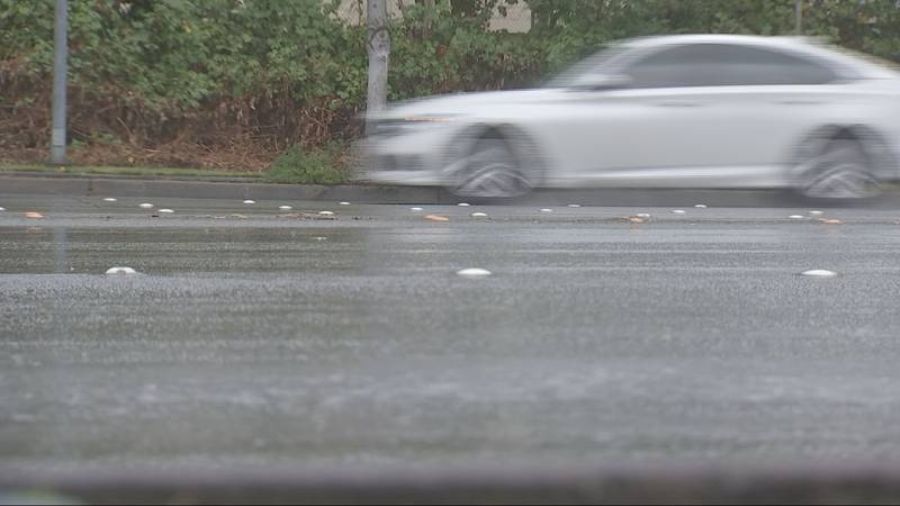UW Virology head: Not yet to the peak of omicron in Washington state
Jan 15, 2022, 7:19 AM

Jeremiah Mack, 9, prepares to receive a Pfizer-BioNtech Covid-19 vaccine from firefighter Luke Lindgren on Nov. 3, 2021, in Shoreline, Washington. (Photo by David Ryder/Getty Images)
(Photo by David Ryder/Getty Images)
In Washington state, at least in the local population that UW Medicine is caring for, it’s not yet safe to say that cases of the omicron variant of COVID-19 have peaked. Dr. Keith Jerome, the head of UW Virology, told Seattle’s Morning News it’s still too early to know.
“We’re not getting as many cases still as some parts of the country. Our positivity rates are as high as they’ve ever been, and most of those are omicron. So let’s hope that peak comes soon, but we’re not there yet,” he said.
Dr. Jerome noted that the recent cases being identified in the area are about 90% omicron, but delta is still hanging on.
‘Health care workers are at their breaking points’: Coalition pushes state lawmakers for solutions
‘Let’s try not to get this’
As for protection against omicron, he says it’s true that masks are still effective, isolation is effective, and that cases are mostly mild among vaccinated individuals, but it is something to worry about.
“It does seem to be a more benign illness. One thing that’s complicated then is that most people who are getting omicron now, most of the population has been vaccinated or has had COVID. So by definition, cases are going to be more benign,” he said.
“It’s very reasonable to continue to take the same precautions. We all should be doing that,” he added. “Let’s try not to get this. One thing people forget is that even though it’s a more benign illness, at UW Medicine, we’ve got more patients in the hospital than ever before, through any part of this. So the hospitals are actually bursting at the seams.”
He says that means if you come in with a broken arm, heart attack, or stroke, it’s harder to get care.
“Our frontline providers are doing an amazing job trying to keep ahead of all of this, and they’re working so hard,” he said. “But if we can go back to that idea to sort of flatten the curve, remember that from early on? If we can do that and just sort of slow this down, to keep some room in the hospital for all the other things that happen in human life, that would be fantastic.”
Dr. Jerome also recognizes that none of the prevention strategies — like masks or distancing — are perfect, but that’s never been the point.
“None of these things are perfect. We’ve been saying that, science has been real consistent about this,” he said. “And there’s a tendency to try to make everything black and white.”
Early on, he recalled, it was stated that a mask is more to protect other people. It was never a guarantee that you won’t get infected if you wear a mask, but it does help.
“The vaccines aren’t perfect,” he added. “They struggle to keep you from getting infected, for example. They’re really quite good at keeping you out of the hospital, but they’re not perfect. All these things are things we can do to slow the rate of infection down.”
Alternatively, Dr. Jerome says, we could have an “omicron party” tomorrow and instead of one million cases, we can have 10 million cases all at once “and no one will be able to get in the hospital.”
“Yeah, it stinks what we have to do, I get that,” he said. “On the other hand, I think a lot of life has been, for many of us, has been some semblance of back to the pre-pandemic days. OK, we wear a mask, but we’re not all sitting in our homes all the time now. It’s common sense ways to minimize risk, while still having a meaningful and rich life.”
To help those who are still at great risk, like doctors, teachers, and young children who cannot be vaccinated, Dr. Jerome says this is where we need to “pull together as a community.”
“There’s a variety of things that we can do to learn to live with this virus,” he added. “It’s not going away, and anybody who tells you that that we’re going to live in a truly post-COVID world is probably not leveling with you. These viruses are now endemic, and we’re going to live with them in some manner for a very long time.”
Spate of Puget Sound region K-12 schools return to remote learning
‘A level we tolerate as a society’
Moving forward, it’s impossible to know if there will continue to be more impactful variants of COVID-19 in the near future. Long-term, COVID is different from the flu and is a different virus, as Dr. Jerome noted, but past the virology aspects, could become more like the flu in terms of its effect on us.
“Maybe it becomes more like the flu and we have waves every year, and some years are worse than others,” he said. “But it’s at a level we can tolerate as a society. Lots of people die of flu, and it’s a tragedy for the people and families involved, and yet, society goes on.”
“That’s probably something we’re going to have here,” he continued. “But we need to get it to a level that’s more controlled, and we need to have a bigger conversation about what that is. Omicron was encouraging in that regard that it is a more mild illness, but are there guarantees that you couldn’t have a new variant that’s very infections and severe clinically? Sure, it’s a concern.”
Hear both parts of the interview with Dr. Keith Jerome in Seattle’s Morning News podcast below:
Listen to Seattle’s Morning News weekday mornings from 5 – 9 a.m. on KIRO Radio, 97.3 FM. Subscribe to the podcast here.














